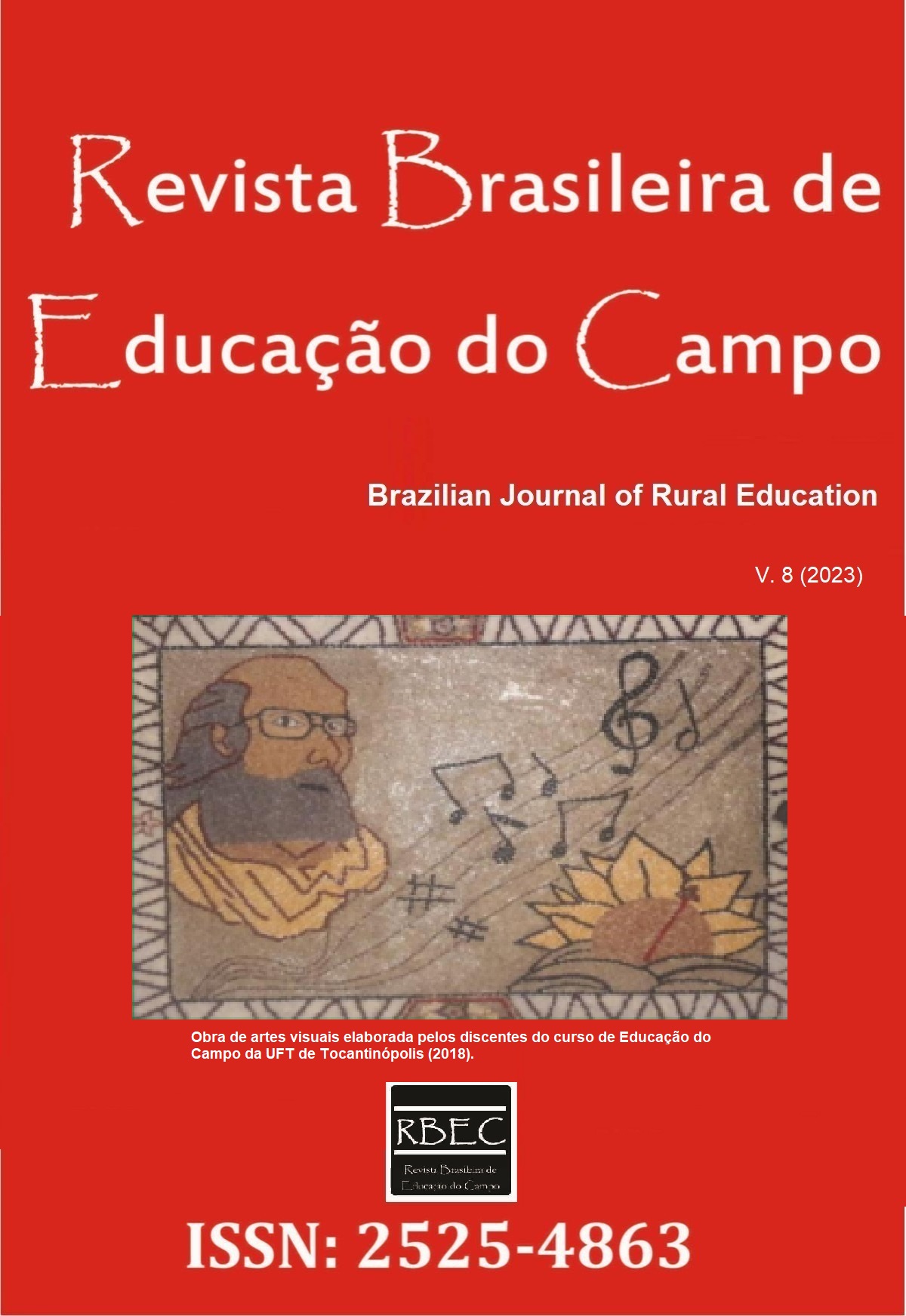The contributions of didactic projects to the teaching of Natural Sciences in rural schools
DOI :
https://doi.org/10.20873/uft.rbec.e15450Résumé
ABSTRACT. The general objective of this study was to analyze the contributions of didactic projects to the teaching of Natural Sciences in rural schools, evidencing relations with the theoretical-methodological principles of Rural Education. To this end, the characterization of the pedagogical practice of the teachers researched was carried out, highlighting the contributions of the projects to the overcoming of traditional pedagogical practices. Field research with a qualitative approach was carried out, and the questionnaire and document analysis of the didactic projects developed in the researched school were used as data production devices. The research field was the Manoel Francisco School Unit, located in the rural community of Baixinha, located about 40 km from the seat of the municipality of Sigefredo Pacheco - Piauí. The interlocutors were two teachers of Natural Sciences who work in the final years of Elementary School. The results indicate that the didactic projects contribute to the teaching of Natural Sciences in rural schools respecting some theoretical-methodological principles of Rural Education, among which the following stand out: the valorization of the students' experiences; the problematization and study of reality; the proposition of interventions; horizontality in the teacher-student relationship, favoring meaningful teaching focused on the students' desires and needs.
Téléchargements
Références
Bardin, L. (1979). Análise de conteúdo. São Paulo: Almedina Brasil.
Brasil. (2002). Diretrizes Operacionais para a Educação do Campo. Brasília: MEC/SECAD.
Cellard, A. (2008). A análise documental. In Poupart, J., & et al. (Orgs.). A pesquisa qualitativa: enfoques epistemológicos e metodológicos (pp. 295-316) Petrópolis: Vozes.
Dewey, J. (1967). Vida e educação. São Paulo: Melhoramentos.
Freire. P. (2014). Pedagogia do oprimido. Rio de Janeiro: Paz e Terra.
Gadotti, M. (2003). Boniteza de um sonho: ensinar-e-aprender com sentido. Novo Hamburgo: Feevale.
Gandin, D. (1983). A prática do planejamento participativo. Petrópolis: Vozes.
Gatti, B. (1997). A formação de professores e carreira: problemas e movimentos de renovação. Campinas, SP: Autores Associados.
Gil, A. C. (2011). Métodos e técnicas de pesquisa. São Paulo: Atlas.
Hernández, F., & Ventura, M. (2017). A organização do currículo por projetos de trabalho: o conhecimento é um caleidoscópio. Porto Alegre: Artes Médicas.
Kilpatrick, W. H. (1967). Educação para uma civilização em mudança. São Paulo: Melhoramentos.
Leite, L. H. A. (1996). Pedagogia de projetos: Intervenção no presente. Presença Pedagógica.
Libâneo, J. C. (2004). Organização e gestão escolar: teoria e prática. 5. ed. Goiânia: Editora alternativa.
Libâneo, J. C. (1992). Tendências pedagógicas na prática escolar. In Libâneo, J. C. (Org.). Democratização da Escola Pública – a pedagogia crítico-social dos conteúdos (pp. 3-35). São Paulo: Loyola. Recuperado de: http://www.ebah.com.br/content/ABAAAehikAH/libaneo. Acesso em: 22 jan. 2021.
Lima, E. S. (2013). Educação do Campo, currículo e diversidades culturais. Espaço do Currículo, 6(3), 608-619. Recuperado de: file:///C:/Users/ACER/Downloads/18998-Texto%20do%20artigo%20(Sem%20identifica%C3%A7%C3%A3o)-35011-1-10-20140416.pdf. Acesso em: 22 jan. 2021.
Luckesi, C. C. (1999). Avaliação da aprendizagem. São Paulo: Atta mídia e educação.
Machado, I. F. (2009). Um projeto político‐pedagógico para a escola do campo. Caderno de Pesquisa: Pensamento Educacional, 4(8), 191‐219.
Mata, F. (2020). A importância de aulas práticas de ciências no Ensino Fundamental II (Monografia de Especialização). Instituto Federal Goiano, Trindade.
Melo, R. A. (2014). Prática docente na escola do campo: diálogos sobre a articulação dos conhecimentos escolares aos saberes da cultura camponesa (Dissertação de Mestrado). Universidade Federal do Piauí, Teresina.
Minayo, M. C. S. (2006). O desafio do conhecimento: pesquisa qualitativa em saúde. Rio de Janeiro: Abrasco; São Paulo: Hucitec.
Moraes, F. T. (2004). Trabalhando com a educação infantil. Canoas: Ed. ULBRA.
Nascimento, F., Fernandes, H. L., & Mendonça, V. M. (2010). O ensino de ciências no Brasil: história, formação de professores e desafios atuais. Revista Histedbr, 39, 225-249. https://doi.org/10.20396/rho.v10i39.8639728
Nogueira, R. et al. (2001). Ensinando por projetos transdisciplinares. Universidade Federal de Pernambuco.
Queiroz, C. T. A. P., & Moita, F. M. G. (2007). Fundamentos sócio - filosóficos da educação. Campina Grande; Natal: UEPB/UFRN.
Queiroz, S. F., Lira, F. L. C., & Tonholo, J. (2017). Feira de Ciências no contexto da educação básica: tradição e inovação. In 10º Encontro Internacional de Formação de Professores (pp.1-15). Aracajú.
Saviani, D. (2013). Escola e democracia: para além da “teoria da curvatura da vara”. Germinal: Marxismo e Educação em Debate, 5(2), 227-239. https://doi.org/10.9771/gmed.v5i2.9713
Téléchargements
Publié-e
Comment citer
Numéro
Rubrique
Licence
© Raimunda Alves Melo Alves Melo, Antonia Dalva França-Carvalho, Weslley Alves 2023

Cette œuvre est sous licence Creative Commons Attribution 4.0 International.
Proposal for Copyright Notice Creative Commons
1. Policy Proposal to Open Access Journals
Authors who publish with this journal agree to the following terms:
A. Authors retain copyright and grant the journal right of first publication with the work simultaneously licensed under the Creative Commons Attribution License that allows sharing the work with recognition of its initial publication in this journal.
B. Authors are able to take on additional contracts separately, non-exclusive distribution of the version of the paper published in this journal (ex .: publish in institutional repository or as a book), with an acknowledgment of its initial publication in this journal.
C. Authors are permitted and encouraged to post their work online (eg .: in institutional repositories or on their website) at any point before or during the editorial process, as it can lead to productive exchanges, as well as increase the impact and the citation of published work (See the Effect of Open Access).














